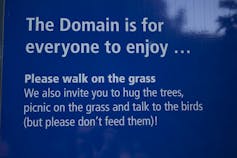what does it mean to be a tree hugger what does it mean to be a tree
We know that trees accept many benefits. In forests they provide habitat, wood, biodiversity and ecosystem services. In cities, they can mitigate the urban heat isle effect past cooling the air and reducing greenhouse gases.
But, perhaps surprisingly, at that place is increasing evidence that trees are also good for our mental wellness.
Are we all tree-huggers?
The thought that humans are intimately connected to the earth has persisted throughout human history and across cultures. In the western world, this connection was most recently described by eminent biogeographer Due east.O. Wilson in his 1984 volume Biophilia. Wilson notes that humans naturally similar to be around other living things.
This theory helps to explicate why people prefer light-green scenes to urban scenes, why pet owners are happier and healthier, and possibly why we're so obsessed with beautiful and cuddly animals.
This hypothesis was the ground of "connection to nature". Psychologists accept at present developed multiple scales used past researchers to determine how connected a person is, and how we might exist able to increase our connection to our benefit.
Connection to nature research is even so developing, but early results seem to indicate that how connected to nature you are is related to your environmental behaviours, such as participation in recycling programs and an increase in overall well-existence and happiness.
Because it is however a new line of research, the relative connection to nature of folks who alive in urban areas and cities versus those of us living in rural places has all the same to exist established. But many researchers and environmental educators have come up to suspect that we are becoming asunder from nature.

Nature-deficit disorder
This disconnect from nature was gear up out in 2005 by American writer Richard Louv in his book The Concluding Kid in the Woods. Louv coined the term "nature-deficit disorder" which means that modernistic humans have become disconnected from nature through our daily activities and this disconnect has had negative consequences in terms of mental and concrete health. Proof of this hypothesis then far lies in studies that show how people with "mod" ailments, such equally ADHD, feet or depression feel improve with exposure to nature.
Based in Northward America, the Children & Nature Network has pages and pages of summarised research from academics around the world that seems to point a strong likelihood this disconnect is a real miracle. The sheer number of studies and their results showing the miracle cure of nature can be overwhelming at times.
There are studies represented such every bit:
- Living in urban areas with more tree canopy cover had increased the likeliness of a amend nativity outcome.
- Inner city girls with a greater view of green from their loftier-rise public housing buildings had more self-subject field than their peers who wait at other buildings.
- Children with ADHD receive the greatest relief of symptoms through participation in green outdoor activities versus other activities without nature.
- But choosing the natural path on your way across campus can increase your positive emotions.
- The pioneering study by Ulrich in 1984 that showed patients recovered from surgery faster and with fewer complaints when placed in a room with a natural view out the window versus looking onto a brick wall.
Do yourself a favour, skim the pages of enquiry summarised in short abstruse class on the Children & Nature Network website. You may start to wonder why we're non hearing more than about getting our children and ourselves back exterior.
This research likewise clearly highlights the important role that urban trees play in cities: their enormous social and psychological benefits may be even greater than ecological benefits.

Reconnecting with the natural world
And so what are our next steps? As I run across information technology, in that location are two things that must exist washed.
Outset, as researchers we really need to directly test the thought of a disconnect particularly between urban/built up areas and more rural areas with plentiful trees. We need to know if people living in areas with fewer copse and natural environments are more disconnected from nature than those living in places where there are abundant trees and wildlife. Deeper still, nosotros could also inquire what interventions seem to connect folks to nature in a meaningful mode?
Second and most importantly, if nosotros are disconnected from nature, what can nosotros exercise near it? Fortunately the above studies and resources testify usa many different activities and ideas we tin can utilise to increase our nature exposure.
Simply a few ideas to endeavor:
-
Bring a plant into your office.
-
Ask council to constitute a street tree outside your office window or improve however all around town.
-
When walking, choose the path through the park instead of around information technology.
-
Take your children to the park, to the natural sections every bit well every bit the play equipment.
-
Exercise the fine art of gardening or even veggie gardening.
-
Institute a tree.
-
Spend some time sitting under a tree. And if you're then inclined, perhaps even requite it a cuddle.
Source: https://theconversation.com/hug-a-tree-the-evidence-shows-it-really-will-make-you-feel-better-21924
0 Response to "what does it mean to be a tree hugger what does it mean to be a tree"
ارسال یک نظر